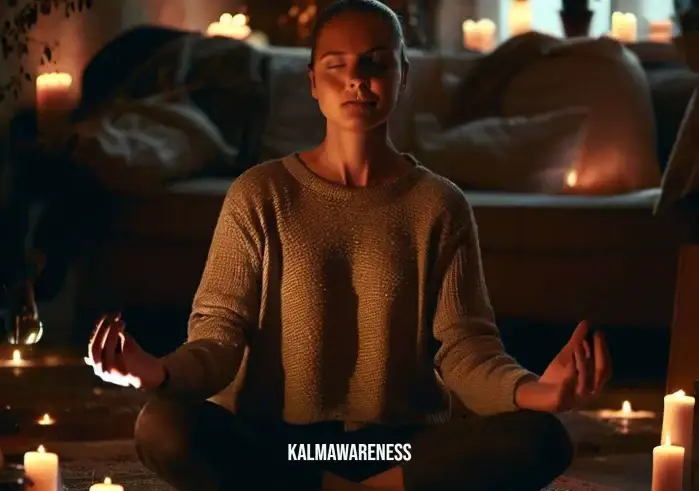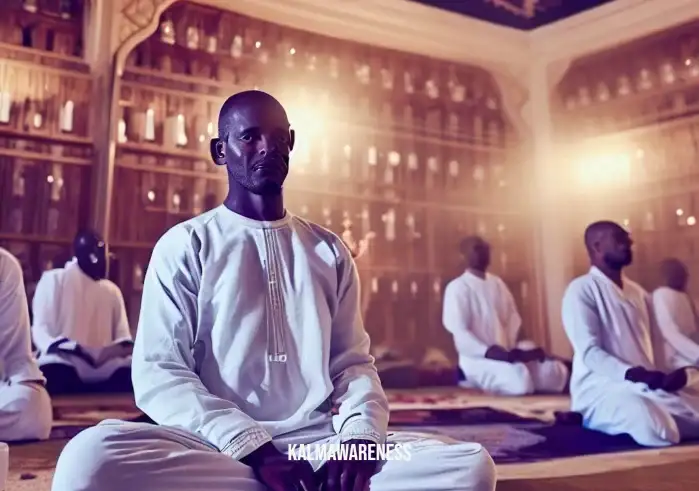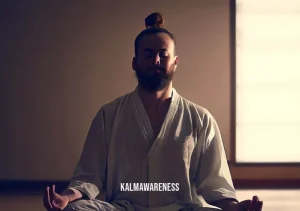Meditating While Sick: The Ultimate Guide to Mindful Healing
When you’re feeling under the weather, it’s tempting to throw all your usual habits and routines out the window. However, certain practices such as meditation can provide both physical and emotional comfort during such trying times.
Why Meditate When You’re Sick?
The main purpose of meditating while sick isn’t necessarily to speed up the healing process – although it can indirectly contribute. Instead, meditation serves to create a peaceful environment within your mind, one that’s conducive to relaxation and restoration. This peaceful state is especially beneficial when dealing with stress associated with illness.
Body Awareness
Illness often prompts us to disconnect from our bodies due to discomfort. However, establishing a stronger connection with your body can be particularly healing. This connection enables us to respond to our bodies’ needs more accurately, promoting faster recovery. One way of achieving this is through a female body scan or even a guy meditating. These practices encourage you to focus on various parts of the body, increasing awareness and encouraging relaxation.
Emotional Resilience
Meditation is also useful for cultivating emotional resilience. Letting go of things not meant for you and practicing self-care are vital parts of dealing with illness. As we let it hurt, then let it go, we create room for healing and growth.
How to Meditate While Sick
You might be wondering how you can meditate when you’re sick. Perhaps you’re accustomed to sitting in a particular posture, but your current state doesn’t allow for that. Here’s the good news: meditation is flexible. You can meditate lying down, sitting in a comfortable chair, or even while taking a gentle walk. The goal isn’t to achieve a specific posture, but to find a position where you’re comfortable and alert.
When meditating, it’s essential to adjust your expectations. You may find it challenging to focus, or you might be easily distracted by physical discomfort or anxious thoughts. This is perfectly normal. Remember, meditation isn’t about achieving a completely clear mind; it’s about acknowledging your thoughts and feelings without judgement.
“Meditation is not evasion; it is a serene encounter with reality.” – Thích Nhất Hạnh
In the midst of your meditation, you may experience emotional releases or insights. Don’t be alarmed; this is merely your body’s way of processing and dealing with the illness. You might realize that you’ve been overworking or that you need to relax every day. These insights can guide you towards more nurturing habits in the future.
Looking out for yourself is crucial during sickness, and meditation is a key tool in this endeavor. It provides the opportunity to turn inward, listening to what your body needs, and encourages you to meet those needs without guilt or hesitation.
In the next part of this guide, we’ll delve deeper into specific meditative practices that you can use when you’re sick. We’ll also explore how to customize these techniques to your current state and needs. So, join me as we navigate through the healing powers of meditating while sick.

Practical Meditation Techniques When You’re Sick
It’s a known fact that meditation can significantly improve your state of mind and well-being, but when you’re sick, the practice of meditating might feel challenging. Yet, the benefits of meditating while sick cannot be overstated. Here, we will delve into the specific meditation techniques tailored to help you through the toughest of days.
Mindfulness Meditation
A go-to method for many, mindfulness meditation aims to keep you grounded in the present moment. Illness can often push us to worry about the future or regret past actions. Mindfulness meditation gently brings you back, allowing you to fully experience the here and now.
Practice This:
- Find a comfortable position – sitting, lying down, or even walking slowly.
- Close your eyes and take a few deep breaths, allowing your body to relax.
- Focus your attention on your breath. Feel the air moving in and out of your body.
- When your mind wanders, gently guide it back to your breath.
- Continue this for a few minutes, gradually increasing the duration as you become more comfortable.
Remember, the aim is not to eliminate thoughts but rather to observe them without judgement. This guided mindfulness practice is a great place to start if you’re new to meditation.
Metta (Loving-Kindness) Meditation
While mindfulness brings us to the present moment, Metta or Loving-Kindness Meditation brings us into a space of compassion and self-love, which are crucial when we’re not feeling our best. By extending kindness to ourselves and others, we foster a sense of connection that can help to ease feelings of isolation or frustration often associated with illness.
Practice This:
- Begin in a comfortable position.
- Mentally repeat phrases like: “May I be healthy. May I be happy. May I be free from suffering.”
- After focusing on yourself, extend these well wishes to loved ones, acquaintances, and eventually, all beings everywhere.
Remember, it’s not about forcing a feeling but rather setting an intention. The feelings of kindness and compassion often follow naturally.
Body Scan Meditation
Another important meditation practice when you’re sick is body scan meditation, where you cultivate awareness of the body. You can consider the female body scan and mindful yoga with Liz as resources for this practice.
Practice This:
- Begin lying down in a comfortable position.
- Start from your toes, paying attention to each part of your body as you gradually move upwards.
- Notice any sensation – discomfort, warmth, cold, tension, or relaxation.
By listening to your body, you’re allowing yourself to gain insight into your physical condition and provide it with the care it needs.
Meditation Resources
| Resource | Description |
|---|---|
| Daily meditations from the journey | A comprehensive guide for daily mindfulness practices |
| Guided Meditation by Jack Kornfield | Expert guidance for deepening your meditation practice |
| Morning meditation for 5 minutes | A quick start to your day with a focus on mindfulness |
Remember, these techniques are tools to help you cope with the discomfort and stress of illness. Always remember to relax every day and give yourself the compassion and care you need during this time.
In the next section, we will dive deeper into the scientific understanding of how meditation benefits us when we’re sick, and how you can maximize these benefits. Continue reading to discover more about the healing powers of meditating while sick.

The Science Behind Meditating While Sick
Meditating while sick may feel counterintuitive when all your body seemingly wants is rest. But meditation is, in fact, a form of rest — not for your body but for your mind. This chapter discusses the scientific evidence behind the therapeutic effects of meditation when you’re not feeling well.
Boosting the Immune System
Let’s start with a quote by Thich Nhat Hanh, a revered Buddhist monk and mindfulness advocate: “Meditation can help us embrace our worries, our fear, our anger; and that is very healing. We let our own natural capacity of healing do the work.”
When you’re ill, meditation, in essence, boosts your immune system by lowering stress. Stressful thoughts and worries can decrease the body’s lymphocytes – the white blood cells that help fight off infection. Lower lymphocytes mean you’re more susceptible to viruses, leading to illnesses. The relaxation that comes from practices like deep relaxation and morning grounding meditation helps to curb these stress responses, supporting your body in its healing process.
Pain Management
Jon Kabat-Zinn, a pioneer in mindfulness-based stress reduction, once said, “You can’t stop the waves, but you can learn to surf.” This statement embodies the power of meditation in managing pain.
Meditation doesn’t remove pain, but it changes our relationship with it. It allows us to step back and observe our pain without getting tangled up in it. Guided practices such as meditation for adrenal fatigue can significantly help in this aspect.
Enhancing Mental Well-being
During sickness, it’s not just the physical discomfort that’s challenging. It’s also the emotional toll. Feelings of anxiety, sadness, or frustration are common when you’re not feeling well. That’s where meditation comes in.
The Dalai Lama once said, “If every eight-year-old in the world is taught meditation, we will eliminate violence from the world within one generation.” While this may seem like an overstatement, the message behind it is crucial. The cultivation of peace and patience through practices like mindful Monday questions and season-building mindfulness can drastically enhance mental well-being during illness.
Mind-Body Connection
Eckhart Tolle, a spiritual teacher and author, stated, “Realize deeply that the present moment is all you ever have. Make the Now the primary focus of your life.”
This quote beautifully encapsulates the essence of meditation – cultivating a strong mind-body connection. By being in the present, we become aware of our body’s needs and respond more intuitively. This connection can be significantly beneficial during illness, ensuring we give our body the care it needs.
Notable Persons & Their Practice:
- Thich Nhat Hanh – Embracing emotions through mindfulness.
- Jon Kabat-Zinn – Surfing the waves of pain.
- The Dalai Lama – Cultivating peace and patience.
- Eckhart Tolle – Fostering a strong mind-body connection.
We hope this chapter provides you with a deeper understanding of the science behind meditating while sick.
In the next chapter, we’ll explore ways to integrate meditation into your daily routine, even when you’re not feeling well. This includes tips for creating a calming meditation space, choosing the right time for practice, and adopting mindfulness into everyday activities. Stay with us to continue your journey of healing and self-discovery.

Incorporating Meditation Into Your Routine While Sick
Meditating while sick might be the furthest thing from your mind, but its benefits are numerous and scientifically validated. But how can you incorporate meditation into your routine when you’re under the weather? This chapter will explore practical ways to integrate meditation into your daily routine and explore some hopeful quotes to inspire and encourage you along your wellness journey.
Establishing A Meditation Space
Creating a peaceful meditation space is one of the first steps towards integrating meditation into your daily routine. In the words of Thich Nhat Hanh, “The present moment is filled with joy and happiness. If you are attentive, you will see it.” A calming environment will help you focus and be attentive to the present moment.
Your meditation space doesn’t need to be elaborate. It can be as simple as a quiet corner in your room. The important part is to make it feel relaxing and inviting. Consider adding elements such as a meditation cushion, calming scents from a mindful women spa, or soothing sounds from guided meditations like guided grace.
Choosing the Right Time
The beauty of meditation is that there is no ‘wrong’ time to practice. That said, some moments might be more conducive to quieting your mind. Consider the words of the Dalai Lama: “There are only two days in the year that nothing can be done. One is called yesterday, and the other is called tomorrow, so today is the right day to love, believe, do and mostly live.”
With that in mind, find a time that works best for you. This could be during the tranquil early morning hours, during a lunch break, or before bedtime with practices such as evening meditation.
Mindfulness in Daily Activities
Meditation isn’t limited to sitting quietly with closed eyes. It’s about maintaining a moment-by-moment awareness of our thoughts, feelings, and surrounding environment. Jon Kabat-Zinn puts it aptly, “Mindfulness is the aware, balanced acceptance of the present experience.”
You can practice mindfulness in daily activities, such as during meals, when walking, or even while knitting. The goal is to be fully present in the activity without judgment or distraction.
Encouraging Quotes
- “The present moment is filled with joy and happiness. If you are attentive, you will see it.” – Thich Nhat Hanh
- “There are only two days in the year that nothing can be done. One is called yesterday, and the other is called tomorrow, so today is the right day to love, believe, do and mostly live.” – Dalai Lama
- “Mindfulness is the aware, balanced acceptance of the present experience.” – Jon Kabat-Zinn
A Summary Table
| Action | In Practice | Benefit |
|---|---|---|
| Establishing a Meditation Space | Find a quiet, relaxing corner and include elements like a cushion, calming scents, or soothing sounds. | Helps focus and attention to the present moment. |
| Choosing the Right Time | Find a time that works best for you, such as early morning, lunch break, or before bedtime. | Allows a routine to be established and makes it easier to integrate meditation into your day. |
| Mindfulness in Daily Activities | Practice mindfulness during meals, when walking, or even while knitting. | Encourages a mindful state throughout the day, not just during designated ‘meditation’ times. |
As we close this chapter, remember the power of presence in your journey of meditating while sick. Let these quotes inspire you and guide you as you find your way back to health and wellbeing. In our next chapter, we’ll delve deeper into different styles of meditation that can help during sickness. Please join us to continue your wellness journey.

Exploring Meditation Styles While Sick
Understanding that you can continue meditating while sick is empowering. However, the realization that there’s a spectrum of meditation styles suitable for your unique situation brings an extra layer of excitement. Each style has its unique benefits and focuses, allowing you to choose what suits your current needs. From mindfulness-based stress reduction techniques to loving-kindness meditations, this chapter explores different meditation styles you can practice while not feeling your best.
Mindfulness-Based Stress Reduction (MBSR)
Mindfulness-Based Stress Reduction (MBSR) is a therapeutic approach that involves mindfulness meditation to alleviate suffering associated with physical, psychosomatic, and psychiatric disorders. The idea is to help individuals who are unwell to deal with their day-to-day life. It involves paying attention to your thoughts and feelings without judging them. The power of MBSR lies in its potential for stress relief. We all know that when we’re sick, our stress levels can rise, thereby delaying recovery. A meditation story by Jon Kabat-Zinn, the founder of MBSR, will walk you through this therapeutic approach.
Loving-Kindness Meditation (Metta Meditation)
The Loving-Kindness Meditation, or Metta Meditation, involves mentally sending goodwill, kindness, and warmth towards others by silently repeating a series of mantras. It doesn’t matter whether you’re under the weather or not; this type of meditation is ideal for cultivating positive feelings and actions towards yourself and others. The phrase “May I be happy. May I be well. May I be safe. May I be peaceful and at ease” is often used. You can customize the phrases to address your current situation. For example, “May I be patient with my recovery. May I find comfort in my discomfort.” Kalm Awareness offers a soothing metta meditation retreat that can guide you through this process.
Guided Visualizations
Guided Visualizations involve focusing on a positive visual image or story to induce a state of relaxation. When done right, it can help distract your mind from the pain or discomfort of sickness and promote a sense of peace and tranquility. It’s like taking a short vacation in your mind. One particularly useful guide is the guided practice activities 3a-2 available on the website.
Progressive Muscle Relaxation (PMR)
Progressive Muscle Relaxation (PMR) involves tensing and relaxing different muscle groups in your body to promote physical relaxation. When you’re sick, your body can become tense due to discomfort. PMR can help you to relax your muscles and promote better sleep or rest. This practice can be performed with guidance from the deep relaxation resource.
“In the midst of movement and chaos, keep stillness inside of you.” – Deepak Chopra
This quote from Deepak Chopra encapsulates the essence of meditation during illness. Whether you’re exploring MBSR, Metta Meditation, guided visualizations, or PMR, the goal remains the same: fostering a sense of inner calm amidst the chaos of illness.
In the next chapter, we’ll dive deeper into how to maintain your meditation practice while navigating the ups and downs of illness. Expect discussions about the importance of gentleness, the power of persistence, and how to adjust your meditation practice in response to your body’s needs. Join us to continue your journey into meditating while sick.

Embracing the Journey: The Way Forward in Meditating While Sick
As we’ve discovered throughout this comprehensive guide, meditation holds the potential to be an empowering tool in managing health challenges. It doesn’t promise instant healing, but it does offer a path to inner peace, greater resilience, and a healthier mindset. In our final chapter, let’s explore how to embrace the journey of meditating while sick, making the most out of this practice, and ensuring it becomes an integral part of your life – in times of health and illness.
Embrace Your Healing Journey
First and foremost, it’s essential to embrace your healing journey. Illness is a part of life, and while it can be challenging, it’s also a time for reflection, self-care, and growth. Meditating while sick should be viewed not as a chore but as an opportunity to deepen your understanding of your body and mind. Engage with your body’s signals, treat them with kindness, and harness the power of your mind with guided tools like the morning grounding meditation.
Celebrate Small Wins
It’s easy to become fixated on the end goal – complete recovery. However, the process of healing is not always linear. Celebrate the small wins, whether it’s being able to sit up and meditate for five minutes or experiencing a moment of peace amidst the discomfort. Recognize these achievements, no matter how small they seem. Each step forward is a victory and contributes to your overall healing journey. A resource that might be of assistance in this context is the mindful monday questions that help you reflect and appreciate your progress.
Regular Practice
Like any skill, meditation requires practice. The more consistent you are, the more effective your meditation practice will become. Even on your good days, don’t abandon this valuable tool. Instead, adapt it to suit your current state of health. Continual practice will make it easier to turn to meditation when you’re not feeling well, offering quicker access to its benefits. The mindful yoga with Liz page offers regular sessions to keep you engaged.
Find Support
A supportive community can play a crucial role in encouraging and maintaining your meditation practice. Whether it’s joining an online meditation group or simply discussing your experiences with loved ones, don’t underestimate the power of social support. Kalm Awareness offers a range of resources like the guided grace that encourages community interaction and support.
“Health is a state of body. Wellness is a state of being.” – J. Stanford
This quote sums up the journey of meditating while sick. Illness affects the body, but wellness is a holistic concept that includes mind, body, and spirit. Through meditation, you’re taking steps towards overall wellness, not just physical health.
Congratulations on taking steps to incorporate meditation into your journey of healing and self-discovery. The path might seem challenging at times, but remember, the essence of meditation lies in being present and accepting of whatever arises, whether it’s comfort or discomfort, joy or sorrow.
Don’t let this be the end of your journey with Kalm Awareness. Our breathe magazine and meditation magazine subscription provide a wealth of information and support for all stages of your mindfulness and meditation journey. Keep exploring, stay curious, and continue to invest in your well-being.





